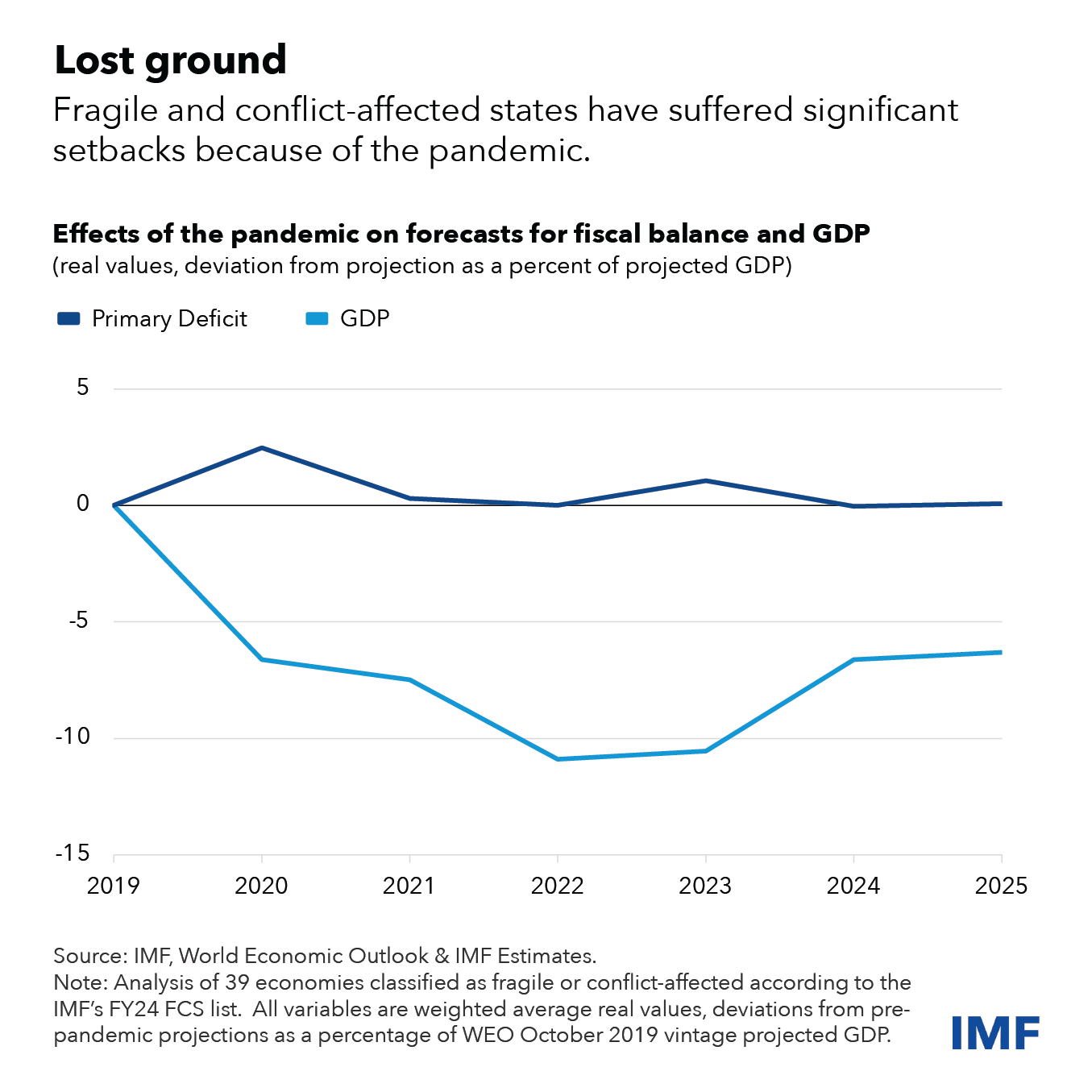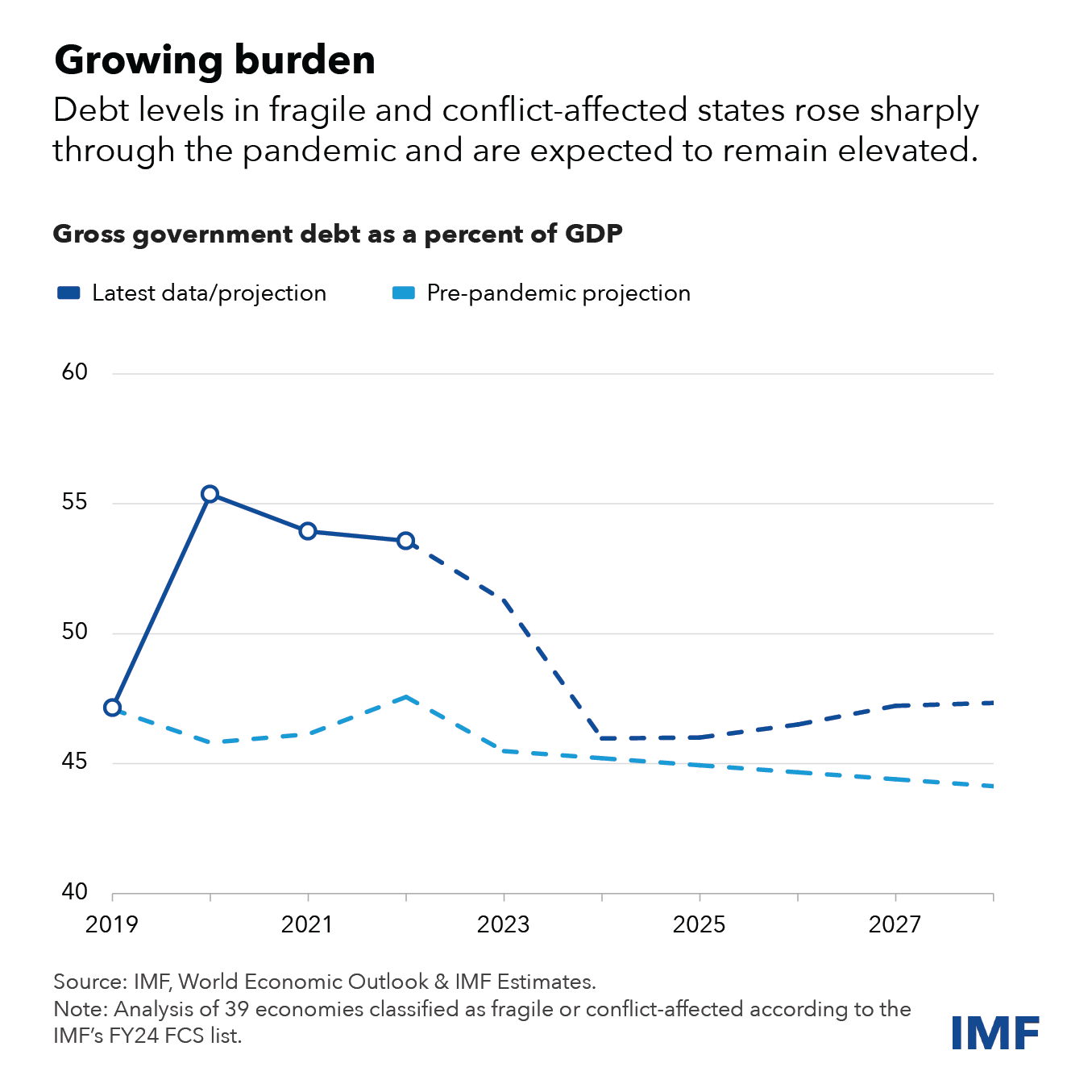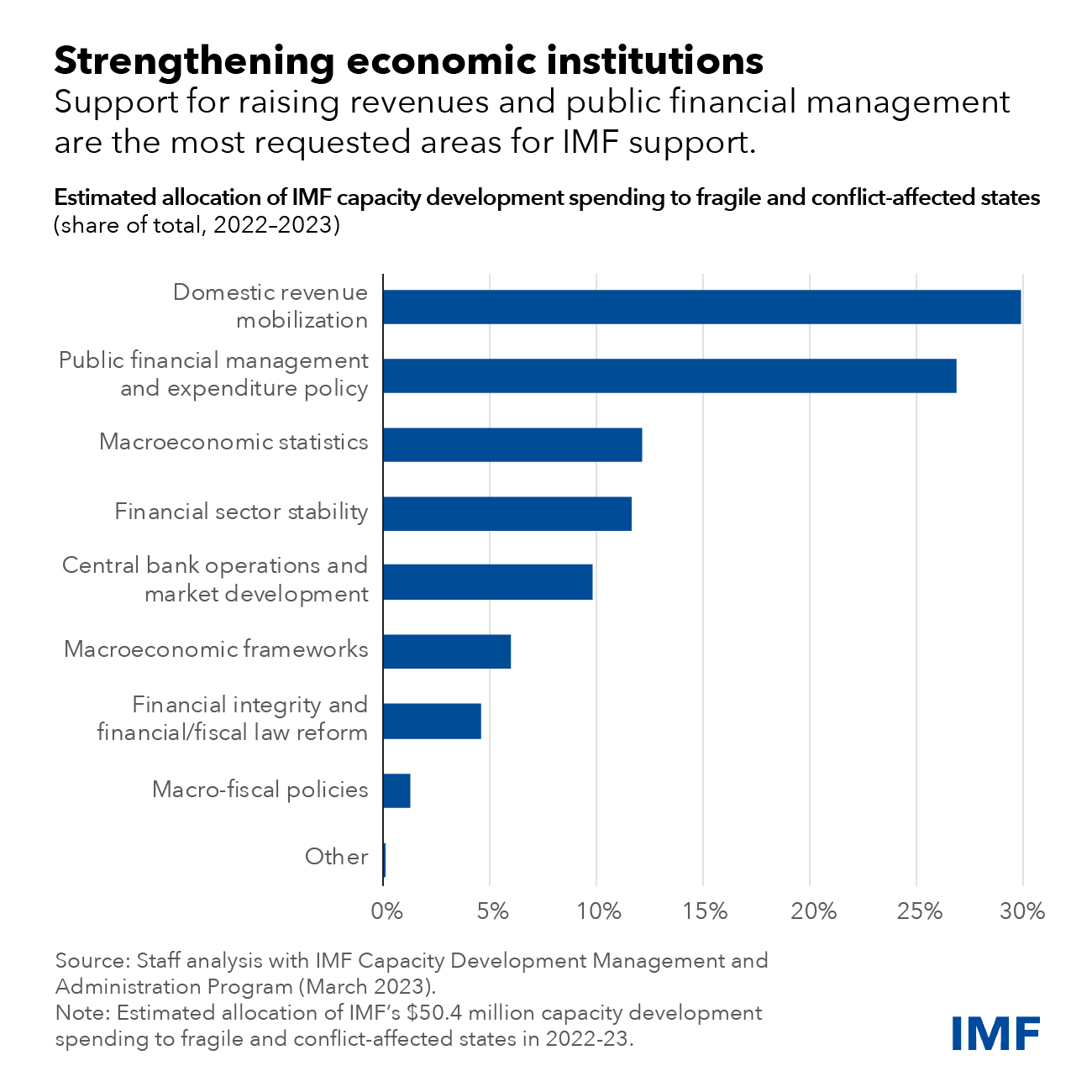Fragile and conflict-affected states have been among the worst hit by the pandemic, Russia’s war in Ukraine, the increase in energy and food prices, climate change, and intensified political instability. Each new crisis aggravates underlying fragilities and creates spillovers that can destabilize entire regions.
Conflicts forcibly displaced a record 108.4 million people last year, many of them refugees hosted in neighboring countries where fiscal conditions are already tight and growth prospects are weak. Fragility and conflict drive fragmentation and can cause reversals in trade, capital flows, and investment. Therefore, supporting fragile states by strengthening their economic and fiscal institutions is a global public good, as all countries can benefit.
The economic fallout from the pandemic hampers policymaking in these countries, which have endured large economic losses compared to pre-pandemic projections. The 39 fragile and conflict-affected states experienced a large loss in economic growth rates between 2019 and 2023 compared to pre-pandemic projections.

Public finances also have deteriorated. Revenue losses during the pandemic were significant and are not expected to recover in line with increased spending. These developments will squeeze government budgets and continue to add to fiscal pressures.
Moreover, economic and fiscal weakness raised debt burdens. Government debt as a share of gross domestic product is down from its pandemic peak,but is now projected to start rising again next year. Previously we had projected this measure to keep declining.

In addition to limited room in government budgets, fragile states share many structural characteristics that render them especially vulnerable to economic shocks, in particular weak institutions, large informal sectors, and governance challenges.
Instability, poverty, and climate risks are also taking a toll. For instance, in Chad and Guinea Bissau, people endure extreme poverty and lack access to basic services. In Burkina Faso, Yemen and Somalia, these conditions are worsened by protracted armed conflicts that forcibly displaced millions of people. Pacific island countries are highly exposed to natural disasters and climate-related risks.
The IMF is one among many organizations providing support, but it plays a crucial role. Our activities include financing and economic policy advice to governments, as well as capacity development—which encompasses technical assistance and training to strengthen economic institutions, for which external financing from donors is critical.
The 2022 IMF Strategy for Fragile and Conflict-Affected States centers on tailoring these activities even more to each country. Closer support for authorities and intensified dialogue with partners are important elements of the new framework. To help strengthen institutions and policymaking, we are stepping up capacity development and expanding our presence in fragile states.

Solid economic fundamentals are a crucial element for fostering inclusive growth and reducing poverty in any country. In fragile states, this requires several policy goals:
- Boosting tax revenues, controlling and prioritizing government spending, and managing public debt.
- Developing well-functioning central banks and ensuring sound financial institutions.
- Strengthening governance and anti-corruption laws and institutions, including to curb money laundering and terrorist financing.
- Publishing timely and accurate economic statistic.
- Developing macroeconomic frameworks and basic tools to inform policy decisions.
Governments in fragile states often face tough choices when economic crises, political divisions, insecurity, and social unrest combine. Limited resources confront policymakers with difficult tradeoffs between policies that can have unintended consequences in terms of taxation, debt, economic growth, and social spending. That’s why our strategy aims for frequent and comprehensive consultation with governments in fragile states, along with these fundamental objectives:
- Understanding the specific context of a fragile or conflict-affected state is crucial for designing the right reforms and providing technical assistance. Somalia saw a peaceful transition of power last year despite an ongoing insurgency and prevalent food insecurity. The analysis in our Country Engagement Strategy showed that insecurity, poor infrastructure, and the lack of a skilled labor force impeded economic growth. A durable fiscal framework is essential to overcome these challenges. That’s why our capacity development focuses on tax policy, revenue administration, and public financial management. Technical assistance – underpinned by Fund support for improving macroeconomic statistics – is also closely integrated with the Extended Credit Facility-supported program, contributing to Somalia’s progress towards full debt relief under the Heavily Indebted Poor Countries Initiative.
- Fragile states need practical and sustained in-country support, keeping in mind that progress is often in fits and starts. Assessing and improving the quality of public investment management, as in the Democratic Republic of Congo, helping create a macroeconomic projection tool for a finance ministry (Timor Leste) or central bank (Iraq) are essential steps to strengthen economic management. For impact to last, policymakers need assistance as they adjust to new and recurrent challenges. Training is often required, especially in volatile environments where staff turnover is high. In response, the Fund is deploying more staff in-country and across our network of Regional Capacity Development Centers, which serve as hubs for knowledge, training, and peer-to-peer learning. Just last year, the IMF placed more experts in fragile states and across these centers in Africa and the Middle East, increasing the number of specialized advisors focused on these countries by 30 percent.
- Countries experiencing armed conflict, a category unto themselves, need capacity building to preserve state institutions. In Ukraine, Russia’s invasion resulted in a 30 percent contraction of GDP last year and placed significant pressures on staff and institutions. The IMF provided technical assistance to the central bank to support continued operations. We are now assisting with the development of anti-money laundering legislation in connection with ongoing financing.
The IMF strategy for fragile and conflict affected states recognizes their particular needs, helping country authorities in the design and implementation of reforms that are tailored to their specific context, increasing the resources available on the ground to support and sustain reforms, and working even more closely with other partners. External donors are crucial to providing this assistance.
Establishing and strengthening effective national institutions, or state-building, requires leadership, patience, and humility. The IMF is stepping up its capacity development to help countries address the complex and difficult challenges they are facing.




